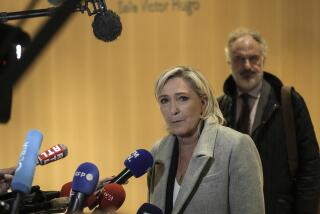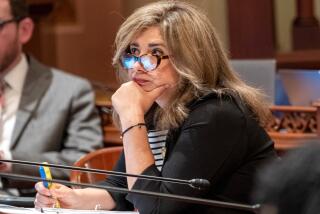Argentine Judge Seeks to Lift 8 Senators’ Immunity in Graft Scandal
- Share via
BUENOS AIRES — A judge investigating allegations of bribery in Argentina’s Senate moved Friday to strip the parliamentary immunity of eight senators in a fast-growing scandal that has battered the government’s reformist image.
“There is consistent, grave and precise evidence” supporting allegations that the senators received bribes from the administration of President Fernando de la Rua in exchange for votes on a labor reform bill, federal Judge Carlos Liporaci said Friday.
In order to interrogate the lawmakers as suspects, the judge asked the Senate to remove the immunity from prosecution held by seven members of the opposition Peronist party and one of the ruling Radical party.
Among the targets are leading Peronists such as Ramon “Palito” Ortega, a former movie star who ran for vice president last year. The evidence includes testimony from senators and tape recordings of conversations among them, according to the judge.
The removal of immunity, which shields lawmakers from prosecution, requires Senate approval.
On Friday afternoon, two of the senators named by the judge said they would voluntarily relinquish their immunity. Three other senators, who are not on Liporaci’s list, submitted their resignations to show that they have nothing to hide. They called for new elections to clear the cloud of suspicion.
The scandal has worsened a sense of political and economic malaise in South America’s most prosperous nation. And it has stunned the De La Rua administration, which took power in December. The president’s center-left Radical party governs in coalition with the smaller, leftist Frepaso party.
Argentines elected De La Rua largely because his austere image contrasted with the flamboyance of former President Carlos Menem, a Peronist. Menem’s decade in office brought economic transformation as well as a whirlwind of scandal: mysterious deaths; alleged illicit enrichment of government officials; Cabinet ministers and judges linked to gangsters; and security forces accused of terrorism.
Promising to attack corruption, De La Rua assembled a team of noted economists, intellectuals and reformers with a serious, low-key style.
But in late June, Sen. Antonio Cafiero, a Peronist elder statesman, unleashed his bombshell. In public statements and, later, sworn testimony, Cafiero alleged that fellow senators took millions of dollars in bribes to pass the labor reform law in May.
The hard-fought legislation was seen as one of the government’s first achievements. It eased rigid labor regulations and job protections in hopes of reducing the nation’s 15% unemployment rate.
Cafiero’s charges stirred up the intrigue and sometimes operatic excess of a fast-talking political culture. Ortega broke down and wept on television Thursday as he professed innocence. Eduardo Bauza, another of the senators facing allegations, reportedly accused Cafiero of stabbing him in the back. Cafiero retorted that Bauza had stabbed him in the heart.
The aggressive Argentine media have played a leading role in the drama. In a scoop this week, the La Nacion newspaper published an interview with a senator who, on condition of anonymity, confessed to taking a bribe and said it was business as usual. On Thursday, La Nacion identified the senator as Emilio Cantarero of Salta province, saying he broke the anonymity agreement when he signed a letter denying the confession, then allegedly sent the reporter messages imploring her to back his denial.
Even as Cantarero declared that he is seeking criminal charges against the reporter, the senator was threatened with a lawsuit for reportedly implicating the chief of the national intelligence service, Fernando de Santibanes, in the scandal.
The misfortunes of De Santibanes, a respected banker and friend of the president, epitomize the government’s disarray. The spy chief had launched a reform of an intelligence service notorious for gangster-like methods and political espionage. He fired about 1,000 agents and brought in U.S. consultants to help modernize the agency.
But in recent days, De Santibanes and Labor Minister Alberto Flamarique have had to repeatedly deny accusations that they funneled kickbacks--put by some versions as totaling $10 million--to senators.
The pressure to identify the culprits and fight off political paralysis has strained the ruling coalition, known as the Alliance. Vice President Carlos Alvarez, the Frepaso’s charismatic leader, has angered the Radicals with his insistence on getting to the bottom of the case. Regardless of the political cost, Alvarez says, the government must break with a tradition of political impunity.
“There have to be political changes right now in the Senate,” Alvarez said Friday. “Even before the justice system has finished the investigation . . . the people have become convinced of their version of the truth. That means there is a crisis of credibility.”
Argentines remain dubious about the prospects for change. Media reports Friday detailed Judge Liporaci’s recent troubles. In 1998, he was investigated for bribery after allegations by a former aide, and endured a formal bid to remove him from the bench. Liporaci was cleared last year by members of the very Senate that he is now investigating.
More to Read
Sign up for Essential California
The most important California stories and recommendations in your inbox every morning.
You may occasionally receive promotional content from the Los Angeles Times.













